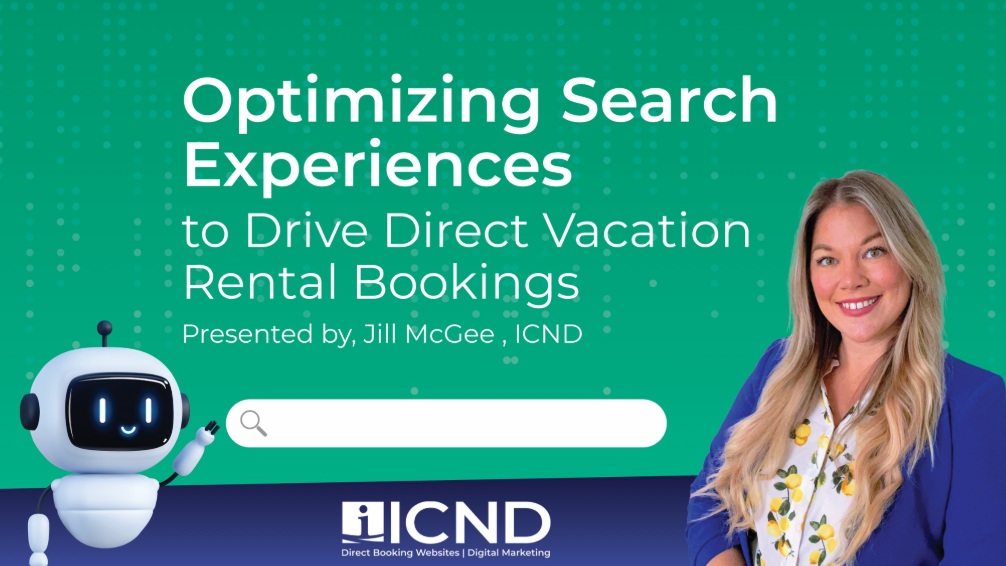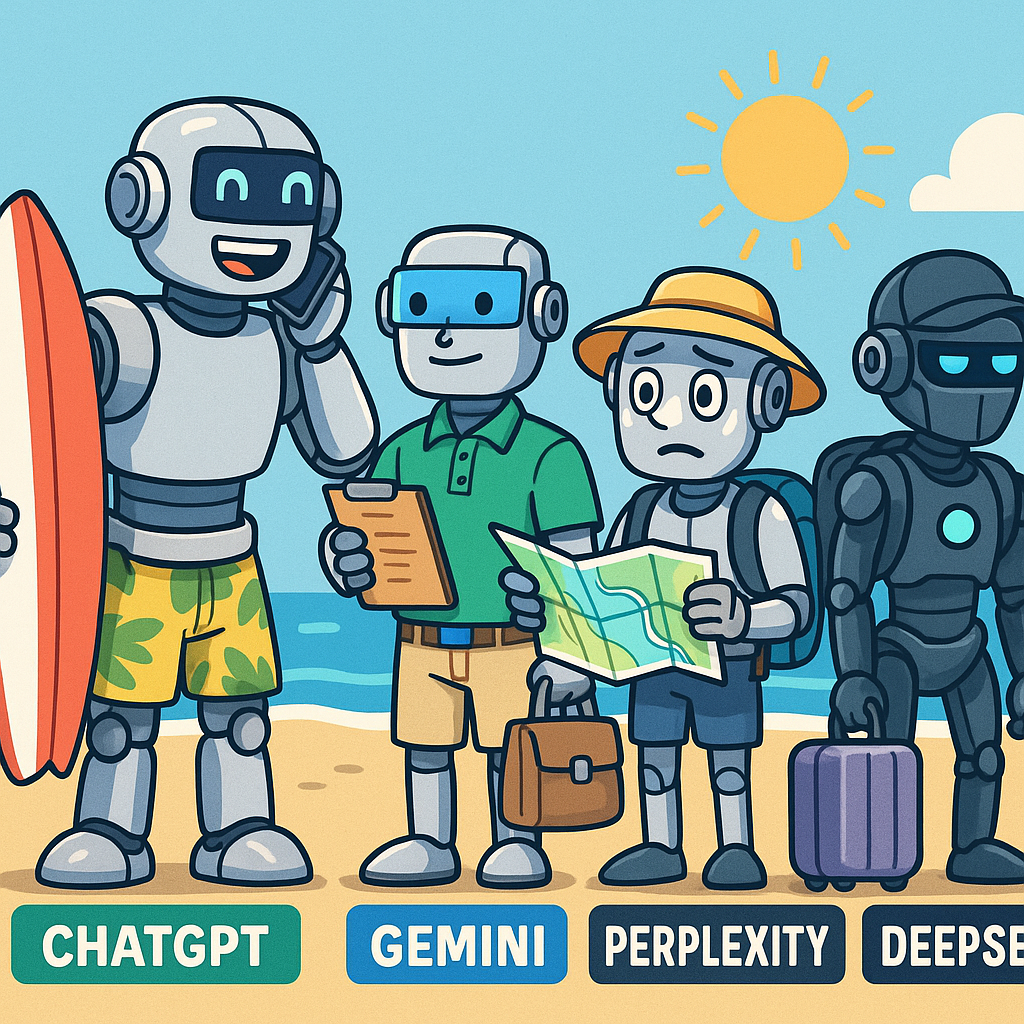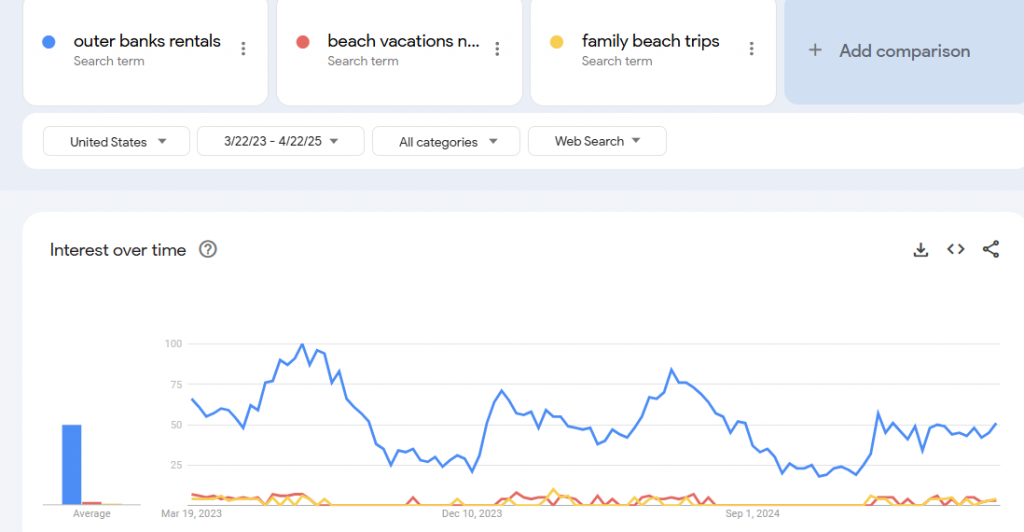
Did You See Jill At VRNATION?
Download the full presentation
As digital marketers in the vacation rental industry, it’s crucial to understand the evolving customer journey. Gone are the days when travelers would simply search for vacation rentals and book a property after just a few clicks. Today, the journey is multifaceted, shaped by a mix of organic search, paid ads, referral sites, and even AI tools. This transformation calls for an updated approach to our digital marketing strategies, allowing us to better engage with today’s vacation rental customer. Let’s break down this transformation and explore how we can optimize our digital marketing strategies to better engage today’s vacation rental customer.

The New Vacation Rental Customer Journey
The journey of a potential guest is far from linear. The path to conversion often includes numerous touchpoints, all influencing a site visitors decision along the way. Today’s customers are interacting with your brand across several different channels and devices before they commit to booking. Understanding these attribution paths and optimizing for new technologies like AI are essential for staying ahead in a competitive market.
How Do We Know the Journey Has “Evolved”?

We can confirm this shift not only based on our experience in the industry but also with data-driven insights. If you dive into Google Analytics 4 (GA4), for instance, you’ll find attribution paths in the advertising section. These paths highlight the different stages a user goes through before booking. From organic search to paid ads and referral sites, users are bouncing between multiple touchpoints. This insight is crucial because it reveals that customers are more informed and discerning than ever before which is why your SEO strategy needs to be at it’s full potential!
How Do We Know that Search Has “Evolved”?
We know search has evolved because we’re seeing the numbers and user behavior shift dramatically. SparkToro reports that over 65% of Google searches now end without a single click, especially on mobile where features like AI Overviews, featured snippets, and local packs dominate the results.
While this trend hits industries like news, quick answers, and ecommerce the hardest, it still impacts vacation rentals. Travelers often get directions, check reviews, view availability calendars, or even compare properties right from the SERP—without clicking through. So even though bookings often still require a click, the path to that click is getting shorter, more competitive, and increasingly influenced by how visible and structured your content is directly within the search results.
Another clear indicator where we can see zero-click searches impacts directly is within Google Search Console. Sometimes, a page holds a top position in Google ranking 1 to 3 but traffic still drops. There’s no penalty, no major algorithm update, and no obvious competitor leap. So what’s happening? This is often a sign of zero-click search at work. When Google serves a featured snippet or AI Overview that answers the question directly on the results page, users get what they need without ever clicking through.
The Fundamentals Of SEO:
- Identify Audience & Analyze Behavior: Understanding your target audience and their search behavior is crucial. Know what keywords they use and what content they find valuable.
- Match Content to User Intent: Tailor your content to address the questions and needs your audience has at different stages of their journey, from initial research to final booking.
- Iterate & Improve Based on Real Data: SEO is a continuous process. Use data to refine your strategy and improve your ranking over time.
Traditional Search Engine Optimization:
A good vacation rental website doesn’t just need to look appealing; it must also meet technical requirements to rank well on search engines. Here’s what you need to focus on:

Technical SEO Technical SEO is your foundation. It ensures that your website is easily crawlable, mobile-friendly, and fast. This includes:
- Running regular site audits to identify and fix issues like duplicate content or broken links
- Ensuring core web vitals (e.g., fast loading speeds) are optimized
- Maintaining a clean URL structure (e.g., /beachfront-rentals, not /?id=34×56)
Proper Content Once your technical foundation is solid, it’s time to focus on creating high-quality content. This includes:
- High-Intent Keywords: Terms like “beachfront vacation rentals in [destination]” indicate strong booking intent
- Property Detail Pages: Ensure your property pages are well-optimized, with clear pricing, high-quality images, and trust signals (e.g., reviews, FAQs)
- EEAT (Experience, Expertise, Authority, Trustworthiness): Google values content that demonstrates expertise, authority, and trust. Build this through informative blogs, area guides, and customer reviews
Trust Signals Trust is crucial in the vacation rental industry. You can build trust by:
- Having a clear user experience (UX) with simple navigation and easy-to-find booking buttons
- Providing social proof through reviews, testimonials, and showcasing your team’s expertise
- Ensuring clear conversion paths, such as “Book Now” buttons that lead users directly to the booking process
- Keep Learning By Reading More ICND Blogs
Optimizing for AI: It’s Just Another Channel

Once your SEO foundation is strong It’s Time To Turn Your Focus Toward Optimizing For AI. But here’s the twist: optimizing for AI isn’t about abandoning what you know. It’s about leveling up and expanding those proven strategies to meet the evolving behaviors of today’s travelers.
AI tools like ChatGPT, Google Gemini, and Perplexity are now influencing how people plan their vacations. Guests aren’t just Googling they’re asking AI to compare destinations, recommend neighborhoods, and even find “the best pet-friendly rental near downtown Charleston.” And if your content isn’t optimized for these new interfaces, you’re missing out on valuable exposure.
Here’s how to bridge the gap:
- Structure for Machines, Write for People: Clear headings, schema markup, and organized content layouts help AI understand and serve your pages. But don’t forget your actual audience is still human. Answer their questions. Provide value. Keep it useful and engaging

- Use AI to Uncover What Guests Are Really Asking: Tools like Search Console and Google Trends, paired with AI-driven data analysis, can surface the long-tail keywords and seasonal booking patterns that matter most. Use this insight to optimize your PDPs, blog posts, and landing pages
- Align With AI “Personalities”: Whether it’s a tool that favors authoritative tone or conversational responses, the way your content is written matters. Match structure and style to the intent of the query, just as you would for traditional SEO
- Lean Into Long-Tail Keywords: These are often the exact kinds of queries AI tools are summarizing in responses. Optimizing for terms like “romantic cabins with hot tubs in North Georgia” can help your content appear directly in conversational search results, where decision-making is already happening
The big takeaway: AI isn’t a replacement for SEO it’s an extension of it. It rewards content that’s fast, trustworthy, well-organized, and informative. Sound familiar? These are the same principles that have always driven successful SEO
Embrace The Evolving Customer Journey

Success in today’s landscape comes down to a blend of strategy, data, and adaptability. By closely analyzing performance metrics like click-through rates, bounce rates, and attribution paths you gain a clearer picture of what’s driving results. Layer in AI-powered tools to help interpret these data sets, and you’re able to uncover deeper insights, react faster, and make smarter marketing decisions
AI isn’t just a tool but it’s also a new channel to optimize for. Just as we optimize for Google or social media platforms, we now need to consider how our content appears in AI-generated responses. That means maintaining strong tradition SEO practices.
Just remember, AI alone won’t carry your strategy, it’s the combination of smart automation and human insight that leads to real, lasting results. When your digital strategy aligns with how modern guests actually search, compare, and book across devices, platforms, and yes, AI-driven tools, you’re not just keeping up. You’re leading the way.
 866.249.6095
866.249.6095